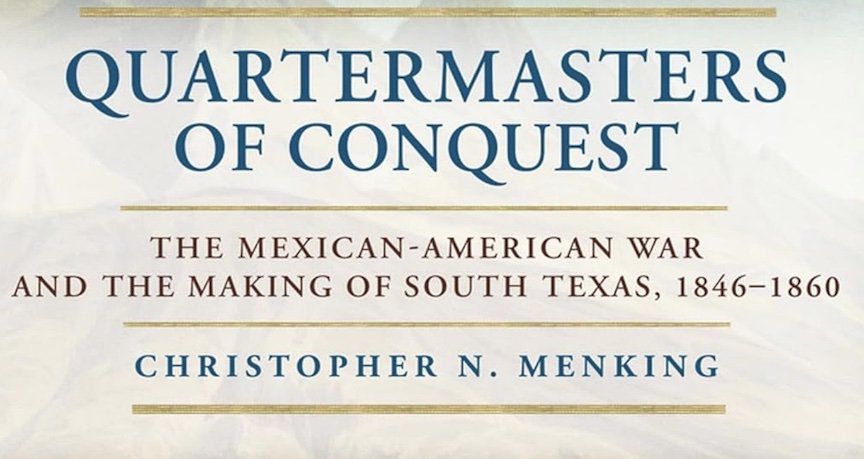In Quartermasters of Conquest: The Mexican-American War and the Making of South Texas, 1846–1860, historian Christopher N. Menking argues that the U.S. Army’s Quartermaster Department did far more than keep troops fed and horses supplied.
It reshaped the economy, society, and settlement patterns of South Texas.
Menking’s book, adapted from his doctoral dissertation at the University of North Texas, takes the unglamorous world of logistics and makes it the driver of conquest.
Menking, a professor of history at Tarrant County College, grew up in Alice, where a majority-Hispanic population lived under the shadow of entrenched white wealth. That “weird puzzle,” as he calls it, stuck with him into graduate school.
He breaks ground in Quartermasters, published by UNT Press.
While researching the Mexican-American War, he discovered a missing piece: supply contracts. As the U.S. Army moved into South Texas and across the Rio Grande, it relied on familiar faces — white Americans and European immigrants — to supply everything from grain to saddles. These contracts, Menking shows, created fortunes that endured long after the war and established the region’s economic hierarchy.
The book’s most compelling chapters trace the flow of the “Army dollar.” In Corpus Christi, a sleepy outpost suddenly boomed after the Army’s arrival. Contracts not only fueled merchants during wartime but also sustained them afterward as the Army established a chain of forts along the Texas frontier. Fort Worth was one of those first military camps along the western frontier of Texas.
Logistics, in Menking’s telling, was less about moving supplies than about moving society.
“The first thing that caught my eye was that very little had ever been written on the logistics in the Mexican War,” Menking said. “That was a void that I thought I could fill. The Army needs resources, they need merchants, they need shippers. Who are they going to turn to? Well, people they know, and most of those are anglo Americans.”
One of the book’s strengths is its bridge between military history and borderlands history. Menking places logistics alongside battles at Veracruz and Monterrey, showing how the Quartermaster Department functioned as an economic engine. Moreover, Menking suggests that the Mexican War marked a turning point in America’s relationship with its military. Where once armies were dismantled after wars, now the Army was expected to stay, to settle, to extend American power.
It was, as he puts it, not yet the “military-industrial complex,” but certainly a society shaped by the military.
“In the early days, we didn’t like the military too much,” Menking said. “But by the time we get to the Mexican War and Civil War, we’re starting to see the Army as it settles the West be this kind of huge social thing, which is kind of what Jefferson [envisioned] when he founded West Point. He wanted it to be this organization, not just for war, but for expansion, for settlement. And I think it’s with the Mexican War and then later the Civil War and the Indian Wars afterward, that we really see the Army having this huge impact on American society.
“In this context, I think it’s for the good, by and large. There is negative for sure. You don’t want to see a whole subset of people disenfranchised, but it does settle South Texas in a far greater form than ever before. We see population growth, we see wealth grow, we see everything start growing in South Texas that you hadn’t seen since the original Spanish colonization.”
Readers might expect a book on 19th-century logistics to be dry, but Menking’s prose, honed in the revision process from dissertation to book, balances detail with readability.
Yes, there are still the inevitable bags of grain and herds of mules, but they are tied to a broader narrative of transformation.
Menking is already thinking ahead. He is exploring a project on the political debates over annexing Mexico at war’s end, or the cultural “tourism” of common U.S. soldiers encountering Mexican culture and landscapes as a soldier tourist.
Quartermasters of Conquest is a deeply researched, thought-provoking study that recasts an often overlooked dimension of the Mexican-American War. By showing how supply chains became social chains, Menking illuminates how the U.S. Army not only conquered territory but also reordered who held wealth and power in South Texas. It is a book that will appeal not only to historians of the war but also to anyone interested in how institutions quietly shape society.
